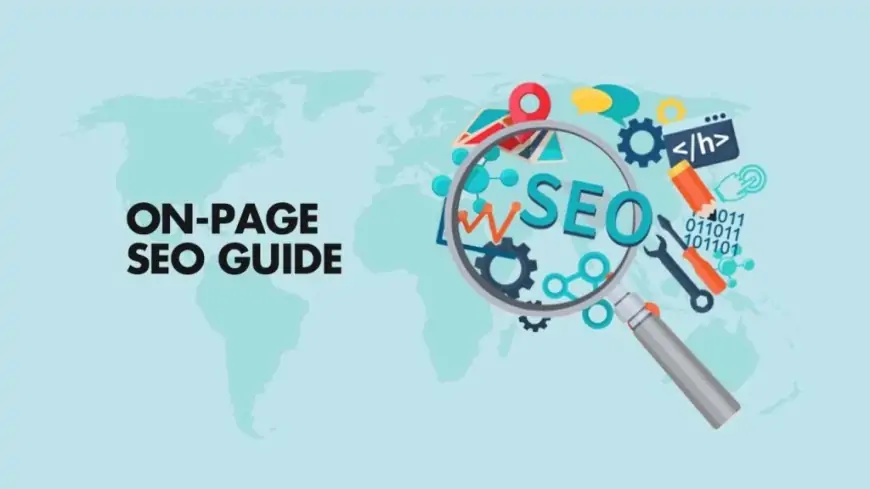What is On-Page SEO? 5 effective strategies
On-page SEO refers to the optimization strategies applied directly on a website to improve its search engine rankings.

What Is On-Page SEO?
On-page SEO involves optimizing your website to make it more attractive to search engines. This includes incorporating keywords, adding internal links, and optimizing URLs. These tweaks can improve your page's ranking in search results. Pages in the first position on a SERP have a click-through rate of 39.8%, compared to only 1.6% for pages in the 10th position.
How On-Page SEO works?
Improving on-page SEO involves enhancing your content quality, showcasing expertise, and establishing trustworthiness. Search engines, like Google, prioritize useful content, so ensure your posts are informative and well-organized. Incorporate relevant keywords, headers, links, and images.
To establish trust, consider the source of your content. Readers are more likely to trust information from a doctor than an anonymous blogger. Additionally, ensure your site is accessible and secure. Slow page load times and lack of an SSL certificate can signal to search engines that your site may not be safe for users. Address these issues through backend adjustments.
On-Page SEO vs. Off-Page SEO
If on-page SEO involves optimizing your website for search engines, then off-page SEO deals with external SEO management. Off-page SEO includes activities like building backlinks, running PR campaigns, or engaging on social media. While these activities don't directly involve your website, they can significantly increase traffic and improve your search engine ranking.
For instance, pages with numerous backlinks often rank higher than those with fewer. On average, the top search result on Google has 3.8 times more backlinks than pages in the second to tenth positions.
Off-page SEO typically requires collaboration with other platforms, affiliate marketers, and PR agencies, whereas on-page SEO is usually manageable on your own or with the help of an experienced SEO service.
Why is On-Page SEO Important?
With over 3.5 billion searches daily, Google presents a vast marketing opportunity for small business owners. On-page SEO is a key strategy to tap into this market share. Moving up one spot in a SERP can boost your site’s click-through rate by up to 2.8%, potentially reaching thousands more viewers.
46% of marketers believe that SEO can drive success in content marketing. Although immediate results are unlikely (SEO typically takes at least four months to show effects), optimizing your site sets the stage for an excellent user experience.
5 On-Page SEO strategies
We've discussed the fundamental aspects of on-page SEO; now, let's delve into the specifics. Employ these strategies to enhance your on-page SEO efforts.
1. Keyword optimization
Keywords are the terms users search for on search engines. Integrating relevant keywords into your content helps Google understand your content's context, potentially boosting its visibility in search results.
However, it's crucial to use keywords naturally and sparingly. Focus on including them in key areas like headers, introduction, and metadata.
2. Leverage metadata
Metadata, including meta titles (the title displayed in SERPs) and meta descriptions (the brief description under the title), is crucial for signaling your page's content to Google. Utilize these elements effectively to improve your page's visibility.
3. Organize your page with a clear structure
To make it easier for Google to scan your page for relevant information, use clear headers to organize your content. Start with an H1 for the page title, then use H2s and H3s as needed to structure the information. This not only helps Google but also improves the readability for your readers.
4. Simplify your URLs
Google values trustworthy content, and having a URL that clearly describes the page can enhance its trustworthiness. Avoid URLs with dates and folder names, as they don't provide much information to users. Instead, use a descriptive slug with a long-tail keyword phrase.
5. Utilize internal and external links
Internal links (links to other pages on your site) help Google understand your site's structure, while external links (links to other websites) can add value to your content. Pages with more inbound links are often perceived as more valuable by Google.
Best practices for On-Page SEO
Before implementing these on-page SEO strategies, it's important to consider some best practices that can enhance your SEO efforts and improve your chances of success.
Create relevant content
While you may have a unique idea for a blog, if it doesn't align with what people are searching for, it may not perform well. Conduct keyword research to identify topics that have good search volume and low competition.
Use SEO tools
Utilize SEO software to analyze your pages, receive suggestions for improvement, and access data on keyword search volumes and rankings. This can help optimize your content effectively.
The importance of regular content updates
Regularly refreshing your content is key, as Google prioritizes up-to-date information. If you find that a once-popular blog post from years ago is slipping in search rankings, it might be time for an update.
There are no strict rules for how often you should update your content, but aim to review your top-performing pages at least once a month. If you notice a decline in their performance, it's probably time for a refresh.
In conclusion, mastering on-page SEO is essential for enhancing your site's organic search visibility. By implementing the strategies and guidelines provided, you can significantly boost your search rankings. Remember, SEO requires both methodical approaches and creative insights, so be prepared to experiment to find the best strategies for your business.












































